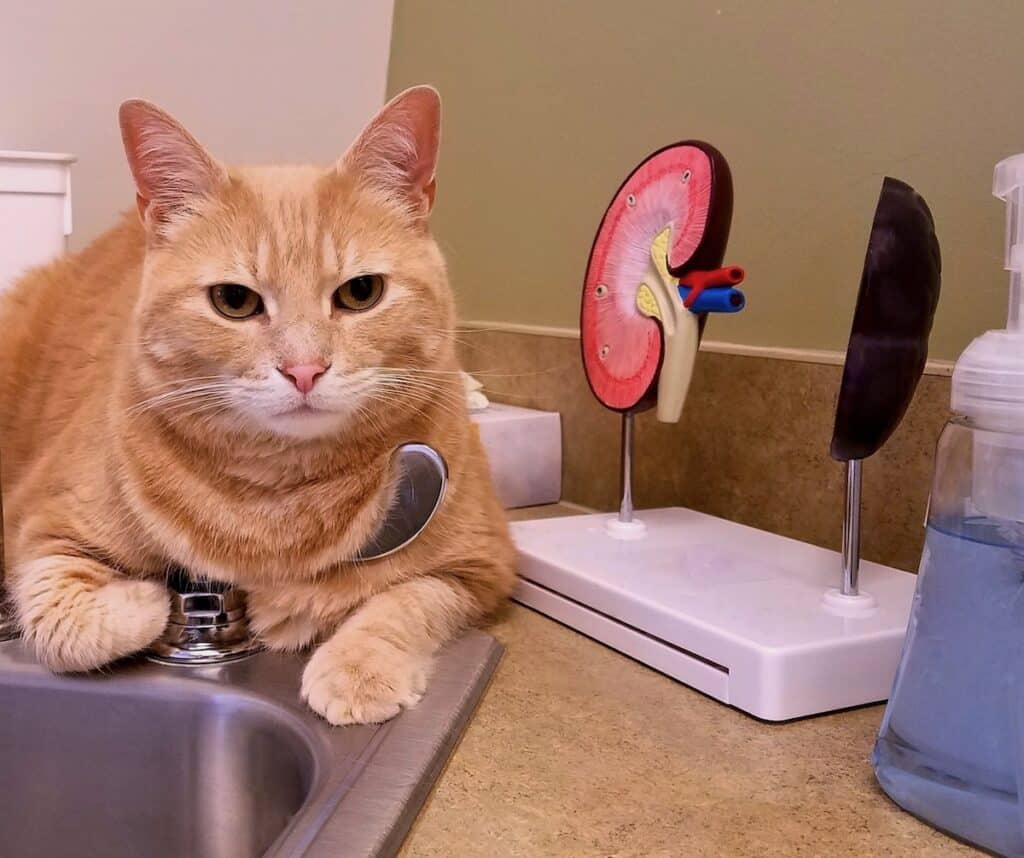Luckily, there are a few things you can do to prevent and treat kidney disease in cats. These include keeping your cat indoors, eating less high-calorie food, and not feeding them too many treats.
Symptoms
Symptoms of cat kidney disease may include poor appetite, lethargy, fatigue, vomiting, and diarrhea. They also may develop anemia, which means that there is not enough red blood cells to carry oxygen throughout the body. Depending on the severity of the condition, a cat may require intravenous fluid therapy.
In order to diagnose kidney failure, a veterinarian will usually perform blood tests and urine tests. They also may perform X-rays or ultrasound. A kidney biopsy may be required to diagnose the disease.
Cat kidney disease is not curable, but there are treatments that may help. Some of the treatments may include medication, vitamins, or intravenous fluid therapy. In addition, a special diet may be recommended. These diets are low in phosphorus and protein, and include omega-3 fatty acids.
Early detection is the best way to avoid complications. Symptoms of kidney disease may appear in a cat as early as 10 years of age. Early detection may help slow the progression of the disease and may allow the cat to live a long, healthy life.
Diagnosis
Getting an early diagnosis of cat kidney disease can help slow the progression of the disease. Early detection can also help prevent a cat from suffering from additional stress.
A vet can detect kidney disease in cats by performing a urine analysis. The urine sample will be analyzed to determine the concentrations of the waste products and other components in the urine. If the urine is dilute or has abnormal concentrations, it can be a sign of a kidney disorder.
Kidneys are vital organs in the body. They produce key hormones and regulate blood pressure. They also help red blood cells develop. Cat kidneys are also important for removing metabolic waste products from the blood. When the kidneys are not functioning properly, toxins in the blood build up and eventually cause the cat to die.
Kidney failure in cats can occur at any age. If it is diagnosed in time, acute renal failure can be reversed. However, chronic kidney failure is typically progressive and does not have a cure.
Treatment
Identifying and treating kidney disease in your cat will help them live longer and enjoy a better quality of life. Your cat’s kidneys filter waste from the bloodstream and regulate blood pressure. They also maintain the balance of minerals and vitamins in your cat’s body.
Kidney disease can occur in cats of all ages. It is best detected early, so your vet can begin treatment right away.
Cats are masters at hiding their weakness, so your vet will want to perform a series of tests. These tests will help determine the stage of your cat’s kidney disease. The test may include a urinalysis, blood work, and an abdominal ultrasound.
Cats with kidney disease may require a specialized diet, intravenous fluid therapy, or medication. They may also need a kidney transplant.
Treatment for kidney disease in cats may include intravenous fluid therapy, antibiotics, hormone medications, and supplements. Your vet will determine the best treatment for your cat based on blood test results, urine tests, and an ultrasound.
Prevention
Taking steps to prevent cat kidney disease is a great way to keep your pet healthy and happy. Your pet’s kidneys are responsible for removing waste from the blood. They are also responsible for managing blood pressure.
Developing kidney disease is not uncommon in cats. The most common causes are infectious diseases, toxins, and disorders of blood flow. Fortunately, it is often treatable.
Cats with kidney failure may show symptoms like weight loss, increased urination, and lethargy. A kidney-friendly diet may be prescribed to help manage the disease. Some cats may also require intravenous fluid therapy.
Managing kidney disease in cats can be a frustrating experience for owners. It is important to monitor the progression of the disease and take steps to prevent it from worsening.
Cats with kidney disease should receive plenty of fluids daily. The kidneys need to stay hydrated to flush toxins out of the blood. A cat’s litter box should always be clean and available. Having a clean litter box can encourage cats to urinate.














